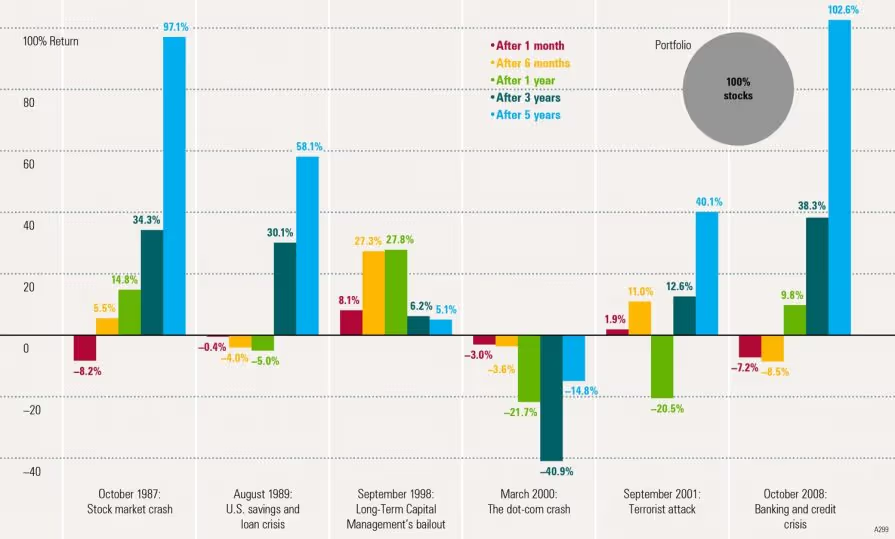
Blog
What Is a Black Swan Event? And Why It Matters
And was the corona-crash a black swan event, or just a chicken in disguise?
A share market crash is a rapid and usually unanticipated drop in prices. The most recent one was recorded on 12 March 2020, in response to the coronavirus pandemic. Such drops often lead investors to wonder: are such drops normal for share markets, or is this different?
You might have heard experts and the media call this a “black swan event”.
Defining a ‘Black Swan’ Event
A black swan event is an unpredictable event that is beyond what is normally expected of a situation and has potentially severe consequences. Its widely accepted that black swan events have three factors:
- Their extreme rarity,
- Their severe impact, and
- The widespread insistence they were obvious in hindsight.
They were originally defined by financial trader Nassim Taleb in his book The Black Swan, though they aren’t just limited to the investing world.
Looking back 2000 years to Roman times, Europeans believed all swans were white. Like purple cows or flying pigs, the black swan was a symbol of something so ridiculous it was impossible. This all changed in the year 1697, when a Dutch navigator called Willem de Vlamingh was shocked to find black swans in Western Australia. Nowadays, black swans can be found in the wild in parts of North America, Europe, and Asia.
“March Madness”
In March of this year, investment values across the globe were punished as a Covid outbreak spread rapidly across the world.
In fact, in many investment markets, records were broken for how quickly values fell. (Incidentally, many have also broken records for how quick they’ve rebounded – even if just like the covid outbreak – the full impacts of the situation are far from over yet).
Was Anything Different About March 2020?
Despite this, dramatic falls in market values are nothing new – they’re a routine, if uncomfortable, part of the investing experience. The last major one was the Global Financial Crisis around 2009, and the notable one before that was the crash of 2001 – caused by the 9/11 terror attacks and overvalued technology companies. Such events don’t run to a schedule, but any reasonable person knows that a series of such shocks are a near certainty across the usual span of a lifetime. In his book, Taleb has this to say about life, let alone investing:
“It is easy to see that life is the cumulative effect of a handful of significant shocks... Go through the following exercise. Look into your own existence. Count the significant events, the technological changes, and the inventions that have taken place in our environment since you were born and compare them to what was expected before their advent. How many of them came on a schedule? Look into your own personal life, to your choice of profession, say, or meeting your mate, your exile from your country of origin, the betrayals you faced, your sudden enrichment or impoverishment. How often did these things occur according to plan?”
Circling back to investing, share prices suffer during financial downturns, but they have always recovered over time.
To display this, the graphic below has been reproduced with permission of global investment research powerhouse Morningstar. It illustrates the cumulative returns of an all-stock (share) portfolio after six historical U.S. shocks. In the short term, uncertainty related to such shocks can create sudden drops in value. For example, this all-stock portfolio posted a negative return in the month following four of the six analysed downturns. However, over longer periods of time, returns were much more attractive, and investors who stayed the course were rewarded. When viewing below, keep in mind:
- Unlike the graph, most people aren’t 100 percent invested in shares, for instance, a usual KiwiSaver balanced fund will commonly only have a 50 percent share allocation, and
- Results after the March 2000 dot com crash aren’t as good as the others as it was followed several months later by the 9/11 terrorist attack.

This historical data above provides clear evidence that major market crashes aren’t as unique as many people might have thought. The obvious conclusion is that patience pays. Though it also begs the question: if these “black swan events” happen so regularly – too frequently to render them true black swan events – then what are they? Maybe they’re more like reliable old “chickens” which we know are coming in some shape or form.
The Bottom Line – Black Swan Events Are a Normal Part of Life. Patient Investors Are Rewarded
Nobody can see the future, but everybody can accept the future is naturally unpredictable.
When it comes to investing, “chicken” seems a much more suitable term than “black swan” for the inevitable shocks which occur over time. Mainly because such major events appear with surprising regularity — the recent coronavirus-inspired crash is only the most recent example.
We’re certainly not downplaying the loss of life or short-term alarm that often accompanies such shocks (such as the 9/11 terror attacks, or Covid-19), but in relation to investing, the data is clear — investors who stay invested for the long haul will reap the rewards.
* ©2020 Morningstar, Inc. All rights reserved. Neither Morningstar, its affiliates, nor the content providers guarantee the data or content contained herein to be accurate, complete or timely nor will they have any liability for its use or distribution. Any general advice or ‘class service’ have been prepared by Morningstar Australasia Pty Ltd (ABN: 95 090 665 544, AFSL: 240892) and/or Morningstar Research Ltd, subsidiaries of Morningstar, Inc, without reference to your objectives, financial situation or needs. Refer to our Financial Services Guide (FSG) for more information at www.morningstar.com.au/s/fsg.pdf. You should consider the advice in light of these matters and if applicable, the relevant Product Disclosure Statement before making any decision to invest. Our publications, ratings and products should be viewed as an additional investment resource, not as your sole source of information. Past performance does not necessarily indicate a financial product’s future performance. To obtain advice tailored to your situation, contact a professional financial adviser. Some material is copyright and published under licence from ASX Operations Pty Ltd ACN 004 523 782.
About the data
Stocks are represented by the Ibbotson® Large Company Stock Index. Calculations are based on monthly data. Data assumes reinvestment of all income and does not account for taxes or transaction costs. For the U.S. savings and loan crisis, August 1989 was chosen because that was the month the Financial Institutions Reform, Recovery and Enforcement Act of 1989 was signed into law. For Long-Term Capital Management, September 1998 was chosen because that was the month the hedge fund was bailed out by various financial institutions. For the banking and credit crisis, October 2008 was chosen because that was the month the Emergency Economic Stabilization Act was signed into law.
You may also like:

What Is Market Timing? Why It Rarely Works

What to Do with a Windfall: Bonus, Lotto or Inheritance


